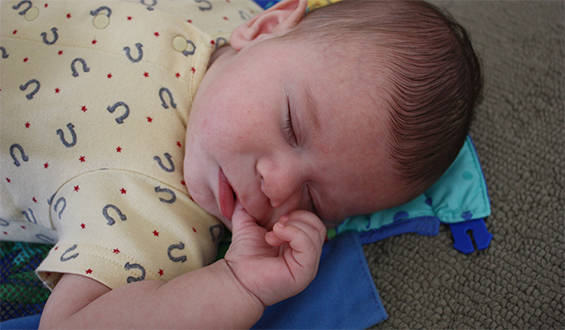Education
Thumbsuckers, Nailbiters May Lessen Future Allergies

A new study published in the journal Pediatrics has found that children who bite their nails or suck their thumbs are approximately one-third less apt to develop specific allergies.
CBS News reports that common allergies appear to be reduced in some measure among those children whose fingers and mouths collide frequently:
“Cat, grass, house dust mite, and dog [allergies] — those were reduced, some significantly, some borderline,” said study author Malcolm Sears, a researcher for the Firestone Institute for Respiratory Health at McMaster University School of Medicine, in Ontario, Canada.
These findings could be additional examples of what has been called the hygiene hypothesis, or the notion that being overly clean may increase the risk of allergies in children.
The research consisted of scientists measuring thumb-sucking and nail-biting habits in more than 1,000 children ages 5, 7, 9 and 11 in New Zealand. When the participants turned 13 and then 32, skin-prick allergy tests were administered.
At 13, tests showed that sensitivities toward allergens were lower by 38% in participants who had sucked their thumbs or bitten their nails compared to those who had not (49%).
When the subjects reached the age of 32, the association remained even when controls such as sex, previous allergies, pets, breastfeeding, and smoking were taken into account.
Bob Hancox, co-author of the research and an associate professor at the University of Otago’s Dunedin School of Medicine in New Zealand, noted that the hygiene hypothesis could also include the overuse of antibiotics.
Kids who suck their thumbs can alter the alignment of their teeth and nail-biters can increase the possibility of spreading germs from their hands to their mouths.
The CDC reports that food and skin allergies have risen among kids in the US in recent decades. Food allergies affected 3.4% of the population in 1997 and now affect 5.4%. Skin allergies rose from 7.4% in 1997 to approximately 11.6% today.
Allergies make up the sixth leading cause of chronic illness in the US, and over 50 million Americans suffer from allergies annually, according to the CDC.
Jacqueline Howard, reporting for CNN, quoted Hancox on the state of research:
“How exactly exposure to microbes alters immune function in this way is not known. But it is suggested that increasing microbial exposure influences the immune system to fighting infections rather than developing allergies.”
The Huffington Post’s Anna Almendrala says the researchers findings were not exactly accurate. She writes that just because a person tests positive for a cat allergy by using a skin prick, for example, that does not necessarily mean a person is going to start coughing and sneezing when near a cat.
“Although thumb-suckers and nail-biters had fewer allergies on skin testing, we found no difference in their risk for developing allergic diseases such as asthma or hay fever,” said Stephanie Lynch, a medical student at the Dunedin School of Medicine in New Zealand, in a statement about her research.
Sears concludes that the analysis explains that a small amount of exposure to dirt is not fundamentally a bad thing.
And looking at thumbsucking in another way, Dr. Perri Klass, writing for The New York Times, refers to Lynn Davidson, a developmental pediatrician at the Children’s Hospital at Montefiore in the Bronx, who says she is less concerned with thumb sucking since kids frequently stop on their own as they grow. With older youths, it is wise to discuss the habit with them and help them find a way to keep their hands busy and out of their mouths.
Author information
The post Thumbsuckers, Nailbiters May Lessen Future Allergies appeared first on Education News.

Comments (0)